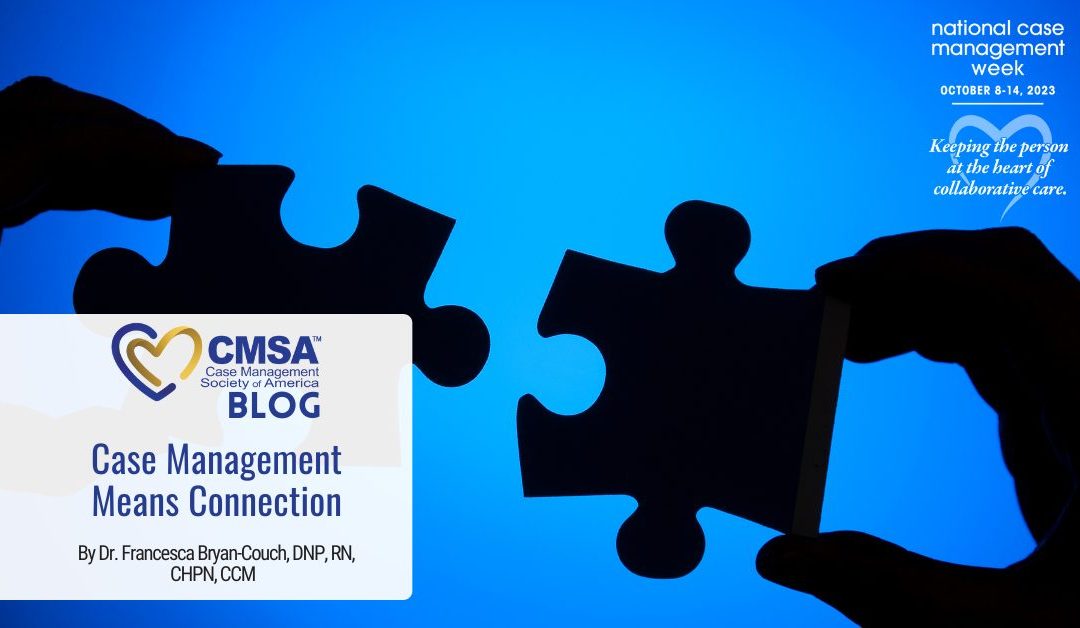By Dr. Francesca Bryan-Couch, DNP, RN, CHPN, CCM
I have been a case manager for many years as a Certified Home Hospice and Palliative Care Registered Nurse and as a Certified RN Case Manager, providing outpatient complex case management for Veterans at the Department of Veterans Affairs. Being an RN Case Manager allows me to spend quality time with Veterans, family members, and caregivers to understand the concerns, challenges, and barriers to achieving desired healthcare goals.
Client-centered and trusting relationships are built by case managers who create safe, culturally sensitive, and non-judgmental spaces where clients can share their difficulties with managing disease processes, navigating large healthcare systems, and concerns with lacking health care and personal resources. Clients will only allow themselves to be vulnerable and share healthcare challenges if the client believes that the case manager cares about them as valuable human beings.
The one component of case management that never changes, regardless of the practice setting, is the human connection. Trust and sincere human connection create the foundation for successful partnerships between clients and case managers. Without a trusting partnership between a client and a case manager, progress toward better health outcomes will be difficult to achieve.
Trusting partnerships are also the foundational building blocks for our case management teams. Case managers are a special group of individuals who must be excellent listeners, demonstrate compassion, always be reliable and trustworthy, attempt to stay organized in spite of the chaos, and must have Sherlock Holmes level of problem-solving skills because each case has its unique intricacies and challenges.
When other members of the interdisciplinary team do not know how to help a client with complex healthcare needs, a case management referral is often placed. Case managers appear to wear superhero capes and have superpowers because when case managers get involved in complex client cases, case managers can help clients begin to engage in healthcare decision-making, increase access to care, improve communication between providers and family members, and decrease barriers which may impact the client’s ability to achieve health care goals.
Case managers purposefully bridge any existing gaps between the client, interdisciplinary team, providers, community and VA resources, and health care systems. As barriers are removed, the client starts to feel empowered that they are capable of making lasting healthcare changes. Family members feel supported which reduces stress caused by chronic health care challenges. Communication between the client and healthcare team members improves, which promotes collaboration and adherence to the treatment plan. Slowly the client gains confidence to independently manage their chronic health care conditions with fewer emergency room visits and/or hospitalizations. Successful health care changes – all because of the interventions provided by a case manager who saw the client as a precious human being and treated the client with dignity and respect.
Case Management Week gives us a chance to remember the value of case managers to the clients we serve, the family members or caregivers who are struggling to remain calm and compassionate during health crises, and the neighbor or friend who wants to be supportive, but does not know what to say or how to help our clients when health care challenges occur.
Case Management Week also gives us a chance to recognize the amazing talents and skills of our case management teammates who stand beside us when we need to advocate for our clients, who let us cry on their shoulder when we lose a client after a long and difficult battle with chronic health care conditions, who make us laugh when we need to find joy amid common challenges, and who keep the coffee pot filled so we can make it through each meaningful day.
Wrap up your CM Week on Saturday, October 14, at 12 pm Eastern with CASE MANAGERS & COFFEE. Join Dr. Colleen Morley and other case management leaders on Saturday for a LIVE NETWORKING SESSION with Moderated Breakout Rooms on current trends, ever-pressing issues and hot topics (plus lots of prizes). Register here: https://cmsapmg.wpenginepowered.com/about/national-cm-week/
Bio Francesca Bryan-Couch CCICM Field Advisor ORGANIZATION: Office of Nursing Services at the Department of Veterans Affairs EDUCATION: DNP, RN, CHPN, CCM PROFESSIONAL AFFILIATIONS: ANA, AzNA, CMSA, ACMA, OONE, OCCHP, Sigma Theta Tau, HPNA SPECIAL NURSING INTERESTS/COMMENTS: Dr. Bryan-Couch has been a nurse for 30 years and has experience in critical care, end of life/hospice care, medical/legal evaluations, worker’s compensation, nursing leadership, nursing education, professional leadership development, research, and case management. Dr. Bryan-Couch is a Care Coordination and Integrated Case Management (CCICM) Field Advisor for the Office of Nursing Services at the Department of Veterans Affairs. She is a National VA Evidence-Based Practice mentor and has her green belt in Systems Redesign. Dr. Bryan-Couch lives on a ranch in rural Arizona with her husband, Brad, where they raise livestock. As a blended family, she has 6 sons and 1 daughter, two grandsons, and 1 granddaughter. One son is a Veteran who served as a Marine. Creating processes and systems that provide high-quality care for Veterans is Dr. Bryan-Couch’s personal mission.


Dr. Francesca: Thank You so much for your excellent Blog piece! You have covered in great deal the value and more in our work as Case Managers.